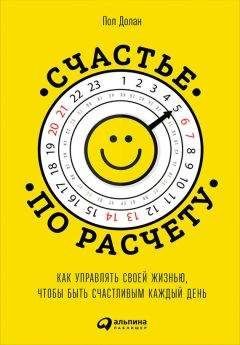Пол Долан - Счастье по расчету. Как управлять своей жизнью, чтобы быть счастливым каждый день

Помощь проекту
Счастье по расчету. Как управлять своей жизнью, чтобы быть счастливым каждый день читать книгу онлайн
95
Tuk M.A., Trampe D., Warlop L. Inhibitory spillover increased urination urgency facilitates impulse control in unrelated domains. Psychologica Science 2011; 22: 627–33.
96
Dolan P., Galizzi M. Because I’m worth it: experimental evidence on the spill-over effects of incentives. Centre for the Study of Incentives in Health. In press.
97
Mallam K.M. Contribution of timetabled physical education to total physical activity in primary school children: cross sectional study. British Medical Journal 2003; 327: 592–93.
98
Metcalf B. Physical activity cost of the school run: impact on schoolchildren of being driven to school (EarlyBird 22). British Medical Journal 2004; 329: 832–33.
99
Monin B., Miller D.T. Moral credentials and the expression of prejudice. Journal of Personality and Social Psychology 2001; 81: 33–43.
100
Effron D.A., Cameron J.S., Monin B. Endorsing Obama licenses favoring whites. Journal of Experimental Social Psychology 2009; 45: 590–93.
101
Zhong C.B., Liljenquist K. Washing away your sins: threatened morality and physical cleansing. Science 2006; 313: 1451–52.
102
Kahneman D., Thaler R.H. Anomalies: utility maximization and experienced utility. Journal of Economic Perspectives 2006; 20: 221–34.
103
Metcalfe R., Powdthavee N., Dolan P. Destruction and distress: using a quasi-experiment to show the effects of the September 11 attacks on mental wellbeing in the United Kingdom. Economic Journal 2011; 121: F81–F103.
104
Schkade D.A., Kahneman D. Does living in California make people happy? A focusing illusion in judgments of life satisfaction. Psychological Science 1998; 9: 340–46.
105
Bradford W.D., Dolan P. Getting used to it: the adaptive global utility model. Journal of Health Economics 2010; 29: 811–20.
106
Oswald A.J., Powdthavee N. Obesity, unhappiness, and the challenge of affluence: theory and evidence. Economic Journal 2007; 117: 441–54.
107
Samaan Z., Anand S., Zhang X., et al. The protective effect of the obesity-associated rs9939609: a variant in fat mass-and obesity-associated gene on depression. Molecular Psychiatry, 2012.
108
Katsaiti M.S. Obesity and happiness. Applied Economics 2012; 44: 4101–14.
109
Graham C., Felton A. Variance in obesity across countries and cohorts. Unpublished working paper, 2007.
110
Gilbert D.T., Pinel E.C., Wilson T.D., Blumberg S.J., Wheatley T.P. Immune neglect: a source of durability bias in affective forecasting. Journal of Personality and Social Psychology 1998; 75: 617; Wilson T.D., Gilbert D.T. Affective forecasting. Advances in Experimental Social Psychology 2003; 35: 345–411.
111
Schaller M., Miller G.E., Gervais W.M., Yager S., Chen E. Mere visual perception of other people’s disease symptoms facilitates a more aggressive immune response. Psychological Science 2010; 21: 649–52.
112
Di Tella R., Haisken-De New J., MacCulloch R. Happiness adaptation to income and to status in an individual panel. Journal of Economic Behavior & Organization 2010; 76: 834–52.
113
Dolan P., Powdthavee N. Thinking about it: a note on attention and well-being losses from unemployment. Applied Economics Letters 2012; 19: 325–28.
114
Weinstein N.D. Community noise problems: evidence against adaptation. Journal of Environmental Psychology 1982; 2: 87–97.
115
Cohen S., Glass D.C., Singer J.E. Apartment noise, auditory discrimination, and reading ability in children. Journal of experimental social psychology 1973; 9: 407–22.
116
Passаli G.C., Ralli M., Galli J., Calт L., Paludetti G. How relevant is the impairment of smell for the quality of life in allergic rhinitis? Current Opinion in Allergy and Clinical Immunology 2008; 8: 238–42.
117
Wilson T.D., Gilbert D.T. Explaining away: a model of affective adaptation. Perspectives on Psychological Science 2008; 3: 370–86.
118
Dolan P., Selya-Hammer C., Bridge J.A., Kudrna L. The impact of cancer on the preferences and subjective wellbeing of patients and their carer. Under review, 2013.
119
Wiggins S., Whyte P., Huggins M., et al. The psychological consequences of predictive testing for Huntington’s disease. New England Journal of Medicine 1992; 327: 1401–5.
120
Gardner J., Oswald A. Do divorcing couples become happier by breaking up? Journal of the Royal Statistical Society: Series A (Statistics in Society) 2006; 169: 319–36.
121
Loewenstein G., Thaler R.H. Anomalies: intertemporal choice. Journal of Economic Perspectives 1989; 3: 181–93.
122
Loewenstein G. Anticipation and the valuation of delayed consumption. Economic Journal 1987; 97: 666–84.
123
Forrest D., Simmons R. Outcome uncertainty and attendance demand in sport: the case of English soccer. Journal of the Royal Statistical Society: Series D (The Statistician) 2002; 51: 229–41.
124
Benjamin D.J., Heffetz O., Kimball M.S., Rees-Jones A. What do you think would make you happier? What do you think you would choose? American Economic Review 2012; 102: 2083–2110.
125
Benjamin D.J., Heffetz O., Kimball M.S., Rees-Jones A. Do people seek to maximize happiness? Evidence from new surveys. National Bureau of Economic Research, 2010.
126
Koepp M.J., Gunn R.N., Lawrence A.D., et al. Evidence for striatal dopamine release during a video game. Nature 1998; 393: 266–68.
127
Nickerson C., Schwarz N., Diener E., Kahneman D. Zeroing in on the dark side of the American dream: a closer look at the negative consequences of the goal for financial success. Psychological Science 2003; 14: 531–36.
128
Translated and as it appears in Coelho, Paulo. (2010) The fisherman and the businessman. Paulo Coelho’s Blog. [online] http://paulocoelhoblog.com/2010/09/08/the-fisherman-and-the-businessman.
129
Akerlof G.A., Kranton R.E. Economics and identity. Quarterly Journal of Economics 2000; 115: 715–53.
130
Loewenstein G. Because it is there: the challenge of mountaineering… for utility theory. Kyklos 1999; 52: 315–43.
131
Medvec V.H., Madey S.F., Gilovich T. When less is more: counterfactual thinking and satisfaction among Olympic medalists. Journal of Personality and Social Psychology 1995; 69: 603.
132
Dockery A.M. The happiness of young Australians: empirical evidence on the role of labour market experience. Economic Record 2005; 81: 322–35.
133
Career Happiness Index 2012:| City & Guilds. http://www.cityandguilds.com/About-Us/Broadsheet-News/November-2012/Careers-Happiness-Index-2012.
134
Нозик Р. Анархия, государство и утопия. – М.: ИРИСЭН, 2008.
135
Dolan P. Happiness questions and government responses: a pilot study of what the general public makes of it all. Revue d’économie politique 2011; 121: 3–15.
136
Dolan P., White M.P. How can measures of subjective well-being be used to inform public policy? Perspectives on Psychological Science 2007; 2: 71–85.
137
Dolan P., Peasgood T. Measuring well-being for public policy: preferences or experiences? Journal of Legal Studies 2008; 37: S5–S31.
138
Crisp R. Hedonism reconsidered. Philosophy and Phenomenological Research 2006; 73: 619–45.
139
Dolan P., Peasgood T. Measuring well-being for public policy: preferences or experiences? Journal of Legal Studies 2008; 37: S5–S31.
140
Cohen S., Doyle W.J., Turner R.B., Alper C.M., Skoner D.P. Emotional style and susceptibility to the common cold. Psychosomatic Medicine 2003; 65: 652–57.
141
Neve J.-E.D., Oswald A.J. Estimating the influence of life satisfaction and positive affect on later income using sibling fixed effects. Proceedings of the National Academy of Sciences 2012; 109: 19953–58.
142
Lyubomirsky S., King L., Diener E. The benefits of frequent positive affect: does happiness lead to success? Psychological Bulletin 2005; 131: 803–55.
143
Golle J., Mast F.W., Lobmaier J.S. Something to smile about: the interrelationship between attractiveness and emotional expression. Cognition & Emotion 2013: 1–13; Ritts V., Patterson M.L., Tubbs M.E. Expectations, impressions, and judgments of physically attractive students: a review. Review of Educational Research 1992; 62: 413–26; Hamermesh D., Biddle J. Beauty and the labor market. American Economic Review 1994; 84: 1174–94.
144
Pinquart M. Creating and maintaining purpose in life in old age: a meta-analysis. Ageing International 2002; 27: 90–114.
145
Siegenthaler K.L., O’Dell I. Older golfers: serious leisure and successful aging. World Leisure Journal 2003; 45: 45–52; Whaley D.E., Ebbeck V. Self-schemata and exercise identity in older adults. Journal of Aging and Physical Activity 2002; 10: 245–59.
146
Hackman J.R., Oldham G., Janson R., Purdy K. A new strategy for job enrichment. California Management Review 1975; 17: 57–71; Steger M.F., Dik B.J., Duffy R.D. Measuring meaningful work: the work and meaning inventory (WAMI). Journal of Career Assessment 2012; 20: 322–37.
147
Wegner L., Flisher A.J., Chikobvu P., Lombard C., King G. Leisure boredom and high school dropout in Cape Town, South Africa. Journal of Adolescence 2008; 31: 421–31.
148
Tsapelas I., Aron A., Orbuch T. Marital boredom now predicts less satisfaction nine years later. Psychological Science 2009; 20: 543–45.
149
Schkade D.A., Kahneman D. Does living in California make people happy? A focusing illusion in judgments of life satisfaction. Psychological Science 1998; 9: 340–46.
150
Канеман Д. Думай медленно… Решай быстро. – М.: АСТ, 2013.
151
Xu J., Schwarz N. How do you feel while driving your car? Depends on how you think about it. Unpublished working paper, 2006.
152
Dolan P., Gudex C., Kind P., Williams A. The time trade-off method: results from a general population study. Health Economics 1996; 5: 141–54.
153
Dolan P. Modelling valuations for EuroQol health states. Medical Care 1997; 35: 1095–1108.
154
Dolan P. Using happiness to value health. Office of Health Economics, 2011.
























